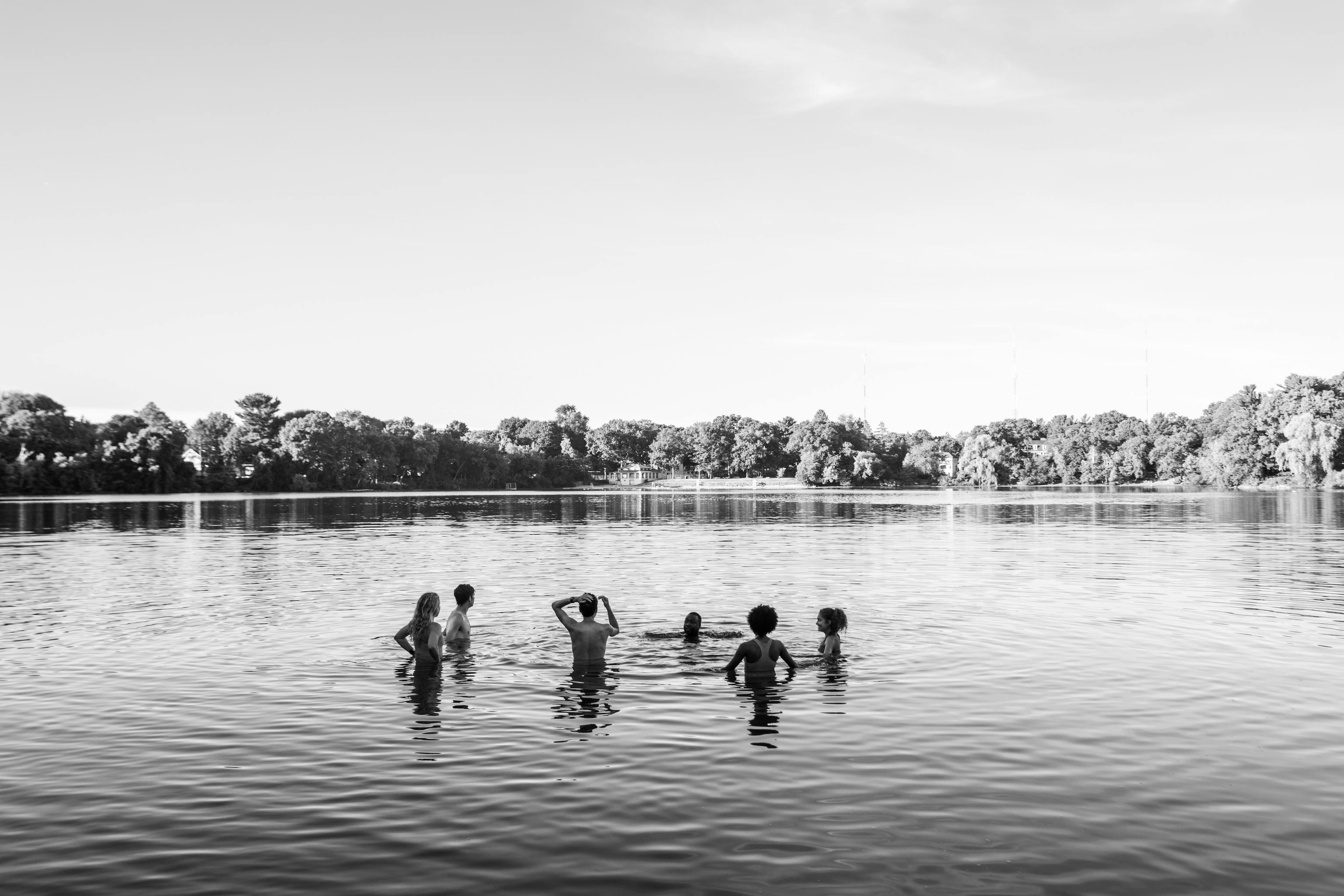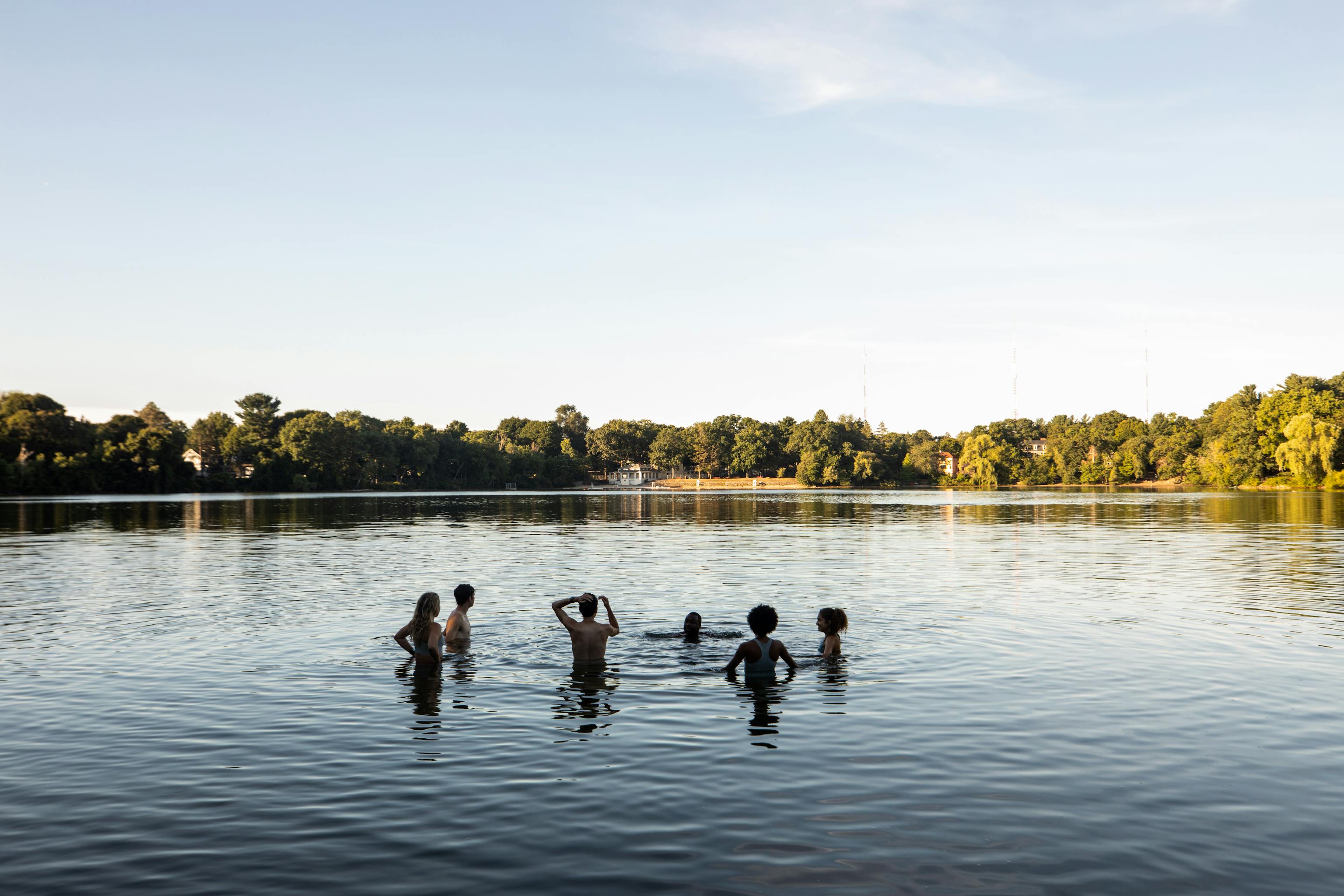
The Swimmers
By Sheridan Wilbur
Photography by Matty Tieuli
Inspired by John Cheever's "The Swimmer" and London’s monthly half marathon swim/run event, we created a Run Cannonball Run route across the sleepy suburbs of Boston to honor summer's end. We stopped to swim whenever the siren’s call of the water called us to deviate from pavement to pond. What follows are images from the day, accompanied by a tale loosely based on the actual events below.
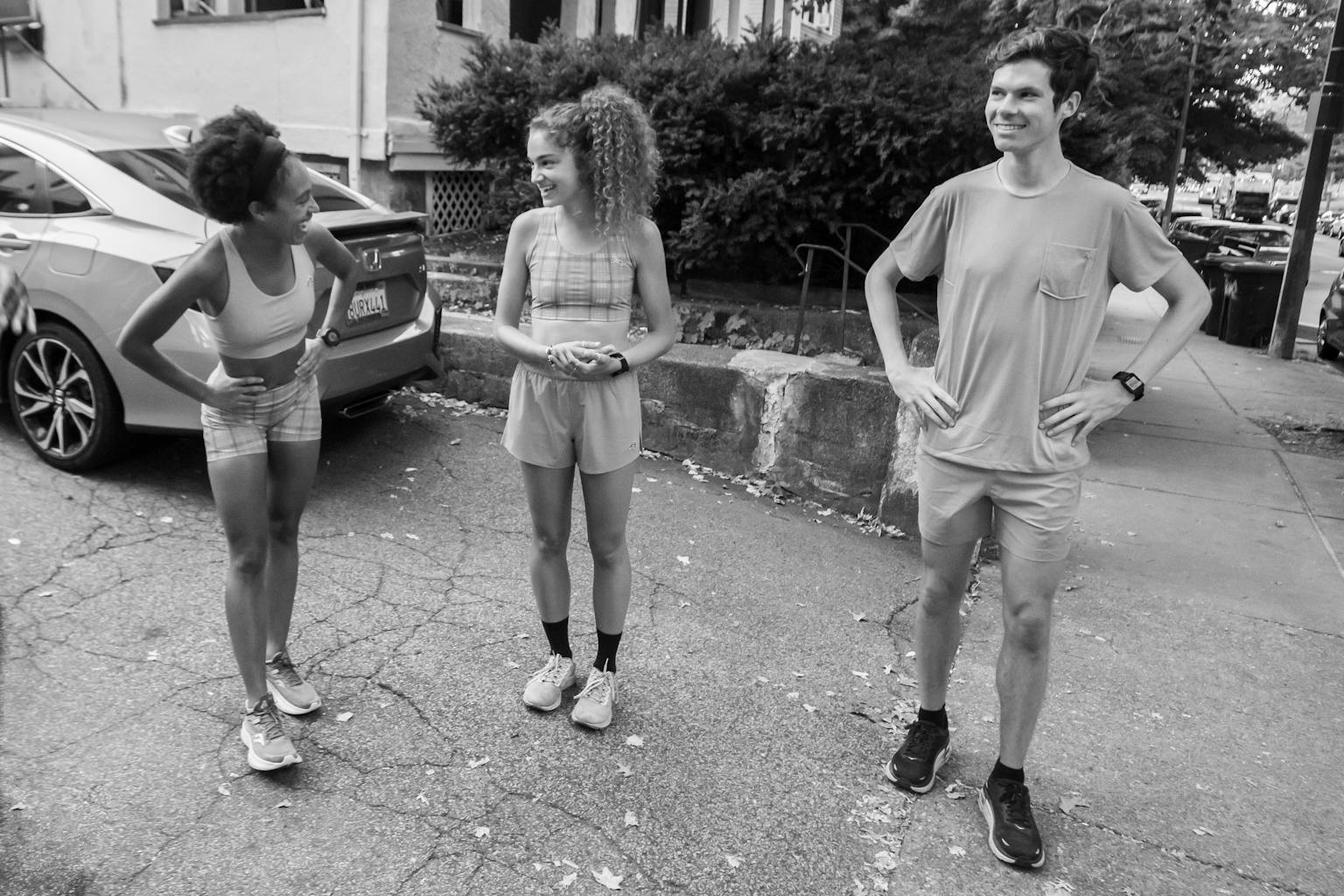
It was one of those midsummer Tuesdays at 5 a.m. when everyone wakes up saying, “I went to bed too late last night.” You might have heard it whispered by the mailman pulling into the post office to fill up his truck, heard it from the lips of the morning news producer herself, struggling to organize breaking news stories before going live, heard it at Logan Airport by ticket agents and TSA agents, heard it in the back of Dunkin, where crew members were suffering terrible caffeine withdrawals as dark roast dripped from the pot.
“I went to bed too late,” said Eva Scott, locking her bike on the fence.
“We all went to bed too late,” said Alex Predhome, as he stepped out of an Uber.
"It must have been Netflix,” said Madison Yerke, helmet in hand, walking her bike towards the fence. “I watched way too much of Never Have I Ever.”
The roads ahead, not designed by any grid system, were a sun-stained shade of black. It was a fine day for a long run, and the sun was already hot. Ryan McGlynn jogged toward the group of runners waiting at the corner.
“I could really use a coffee,” Ryan said.
They were all training for a fall marathon: Ryan for New York City, Alex for Berlin, and Madison and Eva were preparing for Chicago and Erie, their first marathons ever. The impression was definitely one of youth, athleticism, and clement weather. Outside of the 9-5 they're all competitive runners, but their days were swallowed up as grad students, engineers, social media managers, and by retail staff shifts. The relief they’ve discovered from running with company before the sun’s heat and workday’s droll was incomparable. Then it occurred to them that, by taking a dog-leg to the northwest, they could reach their 10 mile morning mileage requirement by water.
Their lives were not confined by corporate jobs or grad school, and the delight they took in this thought could not be explained by its suggestion of escape. In their minds they saw, with a cartographer’s eye, a string of roads and bodies of water that looped across the outskirts of Boston. Alex had made a contribution to modern geography on Strava; he named the run ‘Swim your way through a morning run.’ He was not a practical joker, nor was he a fool, but he was determinedly original – they all had a vague and modest idea of themselves as adventurous figures. The day was beautiful, and it seemed that a long run and swim might enlarge and celebrate its beauty.
They all took off extraneous layers and began to run. They had a simple contempt for training in the summer heat alone. Running was not a sensible activity after 7 a.m., and the solitude of early morning marathon training had saddled the sport with some difficult hours, so an early-houred jump in the water with friends was not just pleasurable, but could be a form of cross training too. Some would have liked to swim without trunks, but this was not possible, considering the nature of this project. If anyone asked where they were going, they would say they were running and swimming to work.
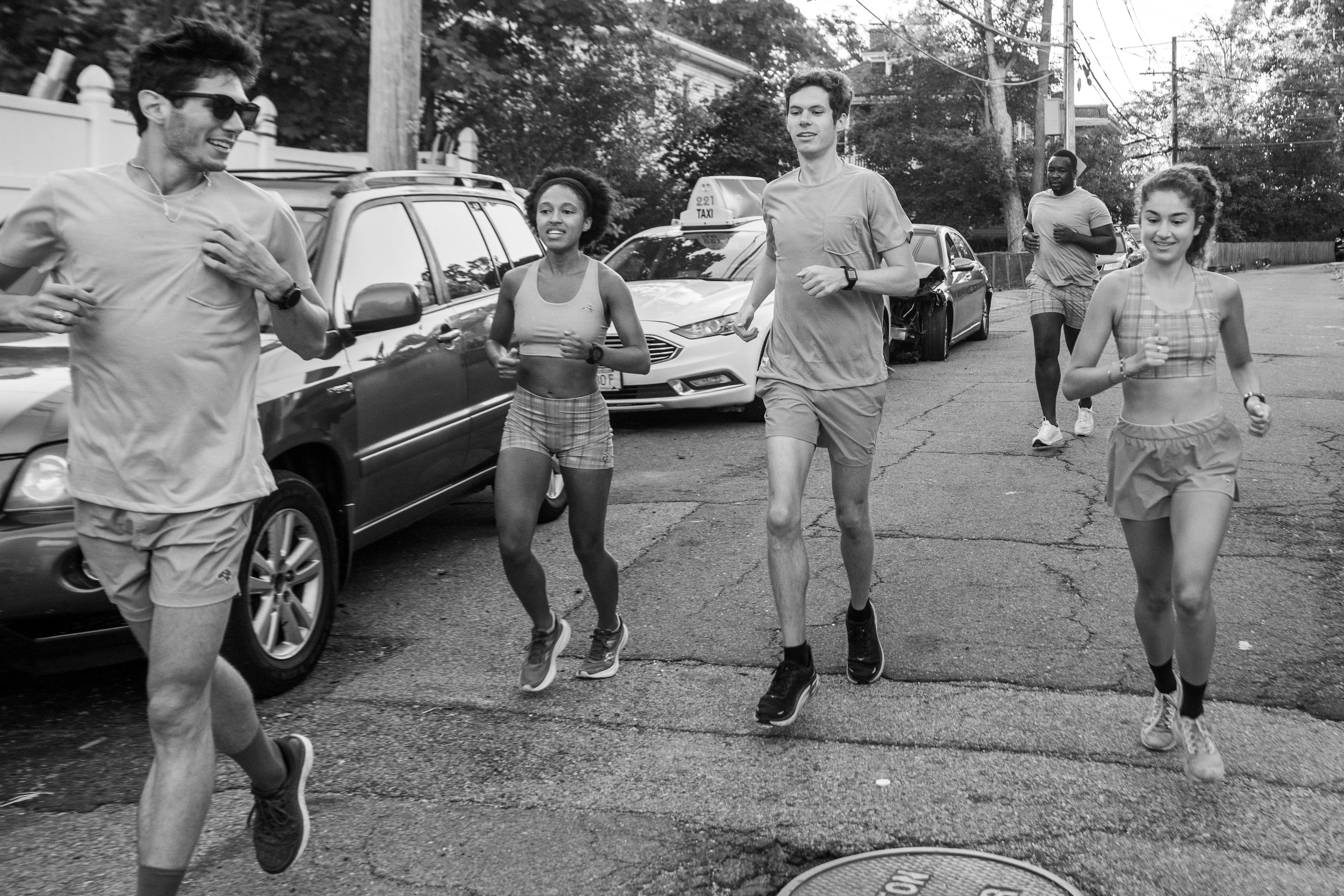
The only maps they had to go by were remembered from Alex’s Strava map or just engraved in their imaginations, but these were clear enough. First there was Chandler Pond, then up Commonwealth Ave, down Heartbreak Hill, and into Crystal Lake. They would run up Hammond Parkway to Hammond Pond and come, after a short trail run, to the train tracks, cross through neighborhoods behind Boston College, and then, the Chestnut Hill Reservoir. The day was lovely, and they lived in a city so droughted with water, it seemed like a merciful indulgence. Their hearts were high, water levels and heart rates low, and they ran up Chestnut Hill Avenue. Making their way around Boston by an uncommon route gave them the feeling that they were explorers, pilgrims, men and women with a destiny; a looming personal best, and they knew that they would find friends all along the way.
They crested up a hill passing a green Volkswagen van, down a one-way towards Roger’s Park that separated the cars from the pedestrians, and ran past some flowering willow trees. En route, they picked up Leandrew Belnavis, who was out for his morning jog. "Follow me!" he said. The group did exactly that. Accepting the opportunity for guidance made sense, as the route fell from their memory with a few more twists and turns. Soon enough, they came out at Chandler's Pond.
The only person in the water was Alex, who stood there up to his waist. Ryan hesitated, thinking he might contaminate himself - damage his intellect and endurance - by swimming in this murk, but reminded himself that he was an explorer, a pilgrim, and that Chandler was the last survivor of nearly 20 ponds that once dotted Allston-Brighton. Ryan walked in further, scowling with distaste as his feet sank into the mud, and swam with his head above water, but even so he was bumped into, splashed, and jostled by Alex.
“How deep is it in there?” Eva called from the shore.
Without any unit of measurement to describe the pond’s depth, Ryan said, “We’re about 60 percent Alex deep. Or ⅔ of Alex in the water.” This unit of measurement seemed satisfactory enough for Eva and Madison to join.
The water refracted the sound of voices and laughter and seemed to suspend it in midair. Some homeowners heard them splashing past the open windows of their living room. Other homeowners were on vacation. Overhead, the sun was rising above the houses on the water and they felt a passing affection for the scene, a tenderness for the gathering, as if it was something they might be able to hold.
In a quick glance, Ryan saw the time on his watch slip away, closer to when he had to write another chapter of his dissertation. They stood by the water for a moment, anxious not to get stuck in any conversation that would delay their pilgrimage. They climbed out of the pond, dusted the murk off their feet – the only unpleasurable part – and jogged up Lake Street.
They made their way past Boston College, down Heartbreak Hill, then to the corner of Commonwealth Ave and Centre Street. They did not want to be seen on the road in bathing trunks but there was no other option and there was no traffic anyway. After swimming in Chandler’s Pond and down the Boston Marathon course, they had run nearly half the length of the loop. They felt tired, clean, and pleased at that moment to be together, pleased with everything.
They ran and ran down Beacon Street, and it had been too long. They were lost. Ryan began to think they missed the turn for Crystal Lake. A train whistle blew, and they wondered what stop on the Green Line was it? They thought of the T stop where, at that hour, a business analyst, a nurse practitioner, a project manager, would all be waiting to begin their day. It was suddenly getting sunnier – that moment the brightness overhead seemed to shine an acute and knowledgeable reminder of the work day’s approach.
This breach in their chain of roads and water disappointed them absurdly, and they felt like explorers seeking to bushwack through branches and obstacles who turned up to strip malls and parking lots. They were frustrated and mystified. It was common enough to get lost on a training run, but Crystal Lake was certainly behind them. Did they pass Lake Ave already? When had they last checked the map – when, that is, had they looked at their phones and ignored all their notifications? It seemed only a week or so ago. Was their memory failing, or had they become so disciplined in the repression of unpleasant social norms they had damaged their sense of the truth?
Had you gone for a Tuesday morning swim that day, you might have seen them, close to naked, wet mops standing on the shoulder of Beacon Street, questioning where to go next. You might have wondered if they were the victim of foul play, or had their car broken down, or were they merely fools? Standing on the sidewalk as minivans and school buses passed, exposed to all kinds of ridicule, they seemed confused. They had known when they started that this was a part of their journey – it had been on a digital and imaginary map – but, confronted with lines of traffic worming through summery light, they found themselves unprepared. They could have gone back, back to the T stop, where people waiting to work would still be sitting in the sun.
In the distance they heard the sound of a car beeping. This cheered them, cleared away all their apprehensions, and they waved their hands to get the attention of the car. The woman driving the car provided directions, even offered to drive them to Crystal Lake.
“Seven blocks north, and take a hard right,” she said.
They would get there by foot, even if it added another mile or two. Perhaps the only way to get to where they want, is to detour from the path they had in mind, and trusting this is the right call. This was the day that they would run and swim across the suburbs of Boston. This was the day! They would not drive across.
They had signed nothing, vowed nothing, pledged nothing—not even to each other. Why, believing as they did that all human stubbornness could be overcome by common sense, were they unable to accept the offer from the woman? Why were they determined to complete this run and swim journey without much help, even if it meant 10 miles becomes 12?
At what point did this training run, this scavenger hunt, become serious? They could not go in the car, could not even recall with any clearness the T working, the sense of inhaling the day’s components, the friendly and relaxed voices saying that they had all gone to bed too late. In the space of a half hour, more or less, they had covered a distance that made going back impossible. They started off then for their most difficult segment.
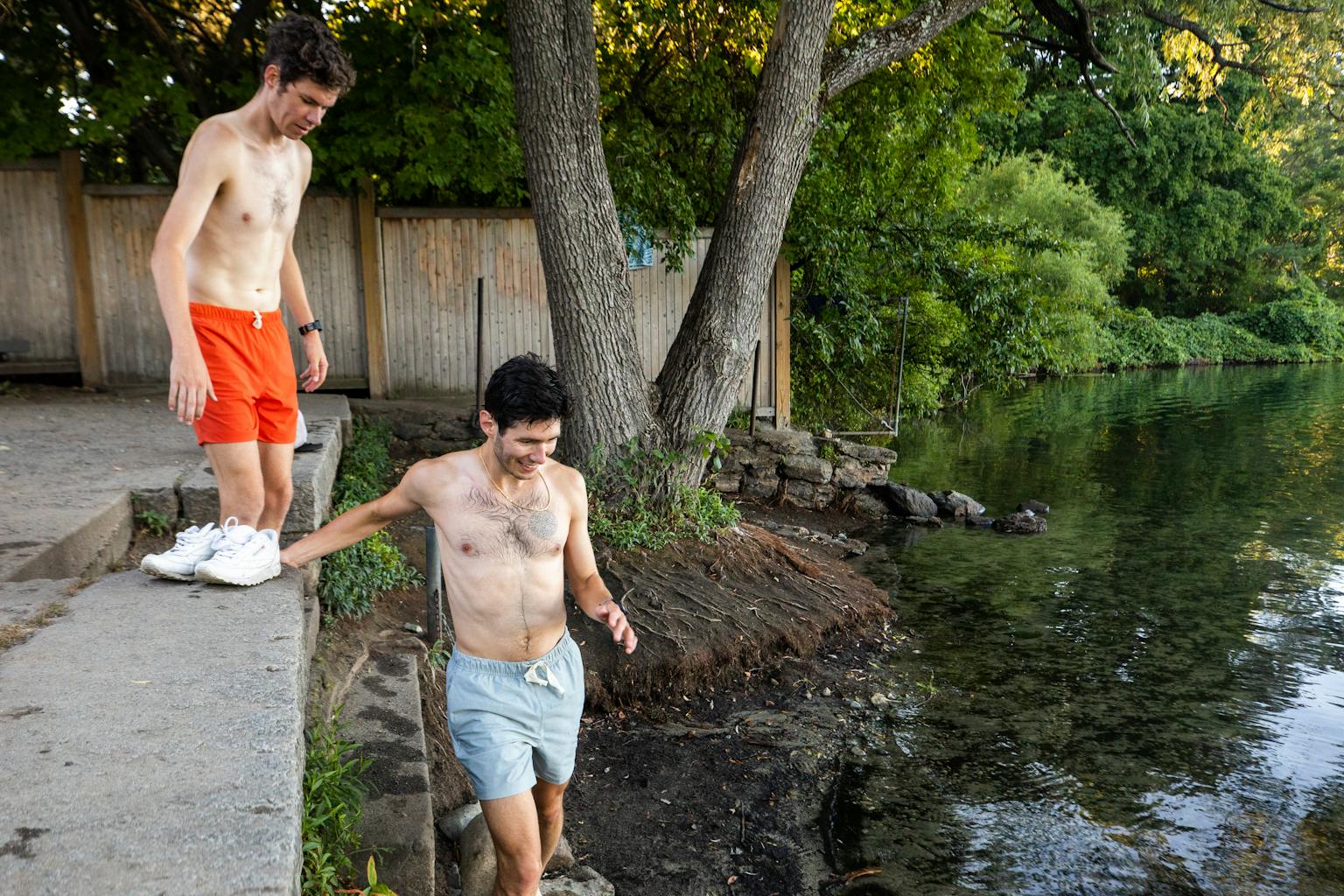
As they arrived at Crystal Lake, the effect of water on voices, the illusion of brilliance and suspense, was the same as it had been at Chandler’s Pond, but the sounds here were louder, harsher, and more shrill. Once they turned down Lake Ave, they were confronted with other rule-breakers. “No swimming” the sign said, but they took off their t-shirts and socks and made their way to the edge of the water. A pair of lifeguards strolling into their 6 a.m. shift blew some whistles, but they had no way of catching them from across the lake.
The couple already in the lake were a middle-aged pair who seemed to bask in the suspicion that they might be training for an Iron Man. They were zealous runners, swimmers and cyclists, but they were not Iron Man competitors, yet when they were accused, as they sometimes were, of being hard core, it seemed to gratify and excite them.
He called “Hullo g,mawnin” to warn the group that they got here first. The woman, with a serene face, was aqua jogging. The man was marking the distance with a floating bottle of beer. They seemed neither surprised nor displeased to see the group at Crystal Lake. The lake was perhaps the oldest in the neighborhood, once called "Baptist Pond" during the first half of the nineteenth century as it was used for baptisms by the First church in Newton: it could not be claimed by any homeowner.
Yet this morning, the couple, for reasons that had never been explained to them, did not wear bathing suits. No explanations were in order, really. Their nakedness was a detail in their uncompromising zeal for natural endurance - the group untied their sneakers politely and removed their socks and shirts.
With a sting that comes from being aware that something good is about to end, they felt a surge of appreciation for those summer days happening now. They had all left their belongings by the wall, walked to the shallow end, and threw themselves into the water.
